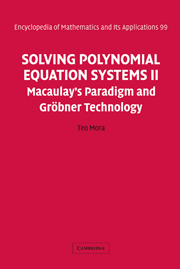21 - Gauss II
from Part three - Gauss, Euclid, Buchberger: Elementary Gröbner Bases
Published online by Cambridge University Press: 05 June 2013
Summary
In the early 1980s when Gröbner bases and the Buchberger Algorithm spread through the research community, there were two main approaches to their introduction: the most common was (and still is) presenting these notions in the frame of rewriting rules, showing their relationship to the Knuth–Bendix Algorithm, and stressing their rôle in giving a canonical representation for the elements of commutative finite algebras over a field. I was among the standard-bearers of the alternative approach which saw Gröbner bases as a generalization of Macaulay's H-bases and Hironaka's standard bases and stressed their ability to lift properties to a polynomial algebra from its graded algebra.
While both these aspects of Gröbner theory and the related results will be discussed in depth in this text, I have for several years stressed its relation to elementary linear algebra: Gröbner bases can be described as a finite model of an infinite linear Gauss-reduced basis of an ideal viewed as a vectorspace, and Buchberger's algorithm can be presented as the corresponding generalization of the Gaussian elimination algorithm. This approach allows me also to link Gröbner theory directly to the Duality Theory which will be discussed in Part five, mainly to the Möller algorithm and (in the next volume) to the Auziger–Stetter resolution.
Information
- Type
- Chapter
- Information
- Solving Polynomial Equation Systems IIMacaulay's Paradigm and Gröbner Technology, pp. 46 - 71Publisher: Cambridge University PressPrint publication year: 2005
